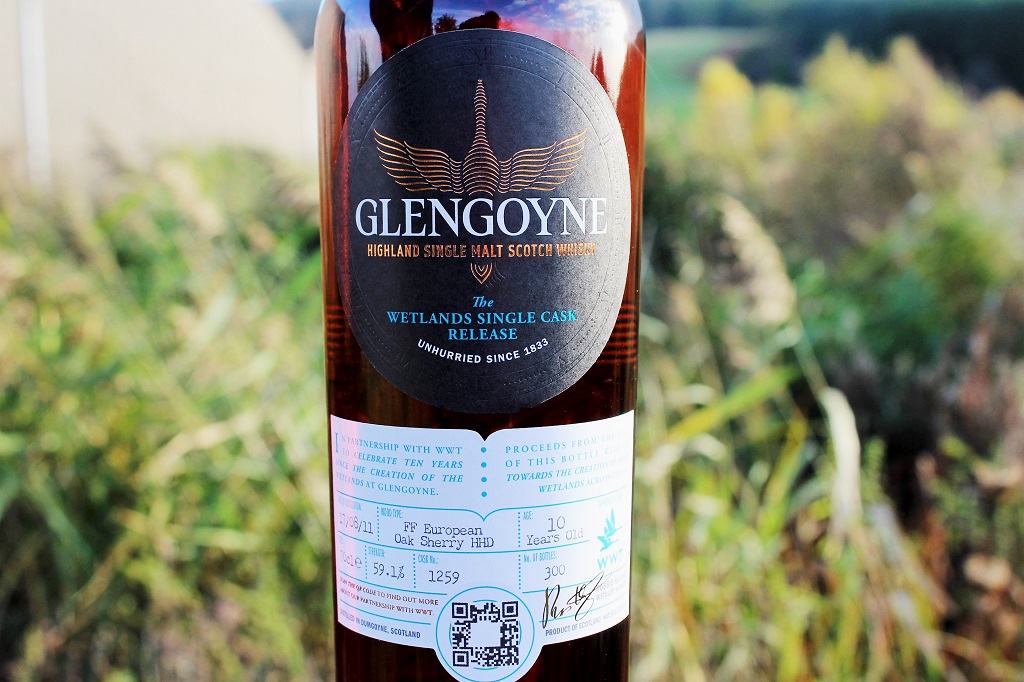Glengoyne Single Malt Scotch Whisky is commemorating the 10 year anniversary of its wetlands with a limited edition 10-year-old release – The Wetlands Single Cask.
Proceeds will go towards supporting the work of the Wildfowl and Wetlands Trust (WWT) who have been partners with Glengoyne throughout their sustainability journey. The WWT, and its Blue Recovery project, aims to create 100,000 hectares of healthy wetlands across the UK.
Wetlands can help drastically slow down climate change, storing twice as much carbon as all the world’s rainforests combined – but they too are under considerable threat from climate change.
Barbara Turing, brand manager at Glengoyne Highland Single Malt, said: ‘The threat of climate change is very real, and we all have a role to play in combatting its effects. We’ve worked with the Wildfowl and Wetlands Trust for ten years, and the partnership has been at the heart of our sustainability work ever since.
‘With the release of the Wetlands Single Cask, we’re delighted to be able to donate proceeds from each bottle sold to support the valuable work that WWT does.’
Distilled in the same year the wetlands were created, the 2011 European Oak Sherry Hogshead Single Cask will output a limited run of 300 bottles.

On the nose, the whisky delivers warming dark brown sugar and treacle, followed by warm spice and apple. The indulgent palate brings the deep, rich flavour of toffee apples with dried fruits, liquorice, and cloves. To finish, mellow oak and spice.
Bottles will be available to purchase via the Glengoyne website priced £120 / 70cl / 59.1% ABV.
The Wetlands Single Cask release coincides with the release of a report commissioned by Glengoyne ahead of COP26, highlighting the pressing need for all industries and individuals to come together to combat climate change.
Glengoyne enlisted climate experts at University College London to look at the potentially devastating effects of climate change on the Scotch industry in the next 50-100 years, and the researchers found that impending heat and drought stress caused by global warming could drastically impact the volume and quality of spring barley in Scotland.
800,000 tonnes of spring barley are required annually in Scotch whisky production and a reduction in yield, as seen in 2018, could cost the industry up to £27million a year.

With a decline in summer rainfall of up to 18% and a 2.0˚C annual rise in temperature by 20801, they also found that summer-droughts, which halted production at many distilleries across Islay, Perthshire, and Speyside in 2018, would likely occur with much greater frequency going forward2.
The study suggested climate change in the next 50-100 years could also threaten to alter the flavour profile of whisky in Scotland. Stages of its production, including malting, fermentation, distillation, and maturation, have all been developed to suit the temperate maritime climate of the area. Warmer air and water temperatures, the report found, would all have the potential to lead to inefficient cooling in traditional distilleries, creating challenges for conserving the character, consistency, and quality of the liquid.
Professor Mark Maslin, climate change professor at University College London who worked on the report, said: ‘The work Glengoyne is doing to reduce their carbon emissions and protect whisky production from climate change is essential. But the whisky industry is just one fish in a big pond, and we need government support, investment, and infrastructure for all of us to be net zero emissions as soon as possible.’
TAGS

